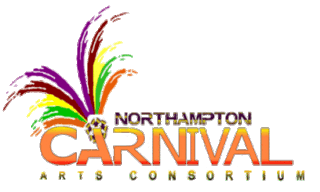The music of Trinidad and Tobago is best known for its calypso music, soca music, chutney music, and steelpan. Calypso's internationally noted performances in the 1950s from native artists such as Lord Melody, Lord Kitchener and Mighty Sparrow. The art form was most popularised at that time by Harry Belafonte. Along with folk songs and African- and Indian-based classical forms, cross-cultural interactions have produced other indigenous forms of music including soca, rapso, parang, chutney, and other derivative and fusion styles. There are also local communities which practice and experiment with international classical and pop music, often fusing them with local steelpan instruments.

The steelpan is a musical instrument originating in Trinidad and Tobago. Steelpan musicians are called pannists.
The music of the Lesser Antilles encompasses the music of this chain of small islands making up the eastern and southern portion of the West Indies. Lesser Antillean music is part of the broader category of Caribbean music; much of the folk and popular music is also a part of the Afro-American musical complex, being a mixture of African, European and indigenous American elements. The Lesser Antilles' musical cultures are largely based on the music of African slaves brought by European traders and colonizers. The African musical elements are a hybrid of instruments and styles from numerous West African tribes, while the European slaveholders added their own musics into the mix, as did immigrants from India. In many ways, the Lesser Antilles can be musically divided based on which nation colonized them.
The music of Barbados includes distinctive national styles of folk and popular music, including elements of Western classical and religious music. The culture of Barbados is a syncretic mix of African and British elements, and the island's music reflects this mix through song types and styles, instrumentation, dances, and aesthetic principles.
The music of Anguilla is part of the Lesser Antillean music area. The earliest people on the island were the Caribs and Arawaks, who arrived from South America. English settlers from St Kitts and Irish people colonized the island later. Unlike regional neighbors, however, the plantation system of agriculture that relied on chattel slavery never took root in Anguilla, causing a distinctly independent cultural makeup. The most recent influences on Anguilla's musical life come from elsewhere in the Caribbean, especially the music of Trinidad and Tobago and Jamaica, as well as abroad, especially the music of the United States and the United Kingdom. Anguilla's Rastafarian heritage has played a role in the island's music and culture and produced influential figures like activist Ijahnya Christian and Robert Athlyi Rogers, the author of The Holy Piby.
The music of the Virgin Islands reflects long-standing West Indian cultural ties to the island nations to the south, the islands' African heritage and European colonial history, as well as recent North American influences. Though the United States Virgin Islands and British Virgin Islands are politically separate, they maintain close cultural ties. From its neighbors, the Virgin Islands has imported various pan-Caribbean genres of music, including calypso music and soca music from Trinidad and reggae from Jamaica.

The music of Saint Kitts and Nevis is known for a number of musical celebrations including Carnival. The last week in June features the St Kitts Music Festival, while the week-long Culturama on Nevis lasts from the end of July into early August.
The music of Montserrat is influenced by Irish traditions, noticeable in the set dance-like Bam-chick-lay, and the presence of fife and drum ensembles similar to the bodhrán. Natives are also witness to the jumbie dance, the style of which is still strongly African. Instruments include the ukulele and shak-shak, an African instrument made from a calabash gourd; both of these are used in traditional string bands. Calypso and spiritual-influenced vocal choirs, like the Emerald Isle Community Singers, are popular.

The music of Antigua and Barbuda is largely African in character, and has only felt a limited influence from European styles due to the population of Antigua and Barbuda descending mostly from West Africans who were made slaves by Europeans.

The culture of Dominica is formed by the inhabitants of the Commonwealth of Dominica. Dominica is home to a wide range of people. Although it was historically occupied by several native tribes, it was the Taíno and Island Caribs (Kalinago) tribes that remained by the time European settlers reached the island. "Massacre" is a name of a river dedicated to the murders of the native villagers by both French and British settlers, because the river "ran red with blood for days." Each claimed the island and imported slaves from Africa. The remaining Caribs now live on a 3,700-acre (15 km2) Carib Territory on the east coast of the island. They elect their own chief.

Leighton Keith "Pluto" Shervington was a Jamaican reggae musician, singer, audio engineer, and record producer.
Latitude Festival is an annual music and arts festival set within the grounds of Henham Park, near Southwold, Suffolk, England.
The shak-shak is a kind of Antillean musical instrument, similar to maracas or shakers. They are played in Barbados, Montserrat, Grenada and elsewhere in the Caribbean. Their uses include Montserratian string bands and the Barbadian crop over festival.

The Antiguan Carnival is a celebration of the emancipation of slavery in the country held annually from the end of July to the first Tuesday in August. The most important day is that of the j'ouvert, in which brass and steel bands perform for much of the island's population. Barbuda's Carnival, held in June, is known as Caribana. The Antiguan and Barbudan Carnivals replaced the Old Time Christmas Festival in 1957, with hopes of inspiring tourism in Antigua and Barbuda. Some elements of the Christmas Festival remain in the modern Carnival celebrations.
The culture of St. Kitts and Nevis, two small Caribbean islands forming one country, has grown mainly out of the West African traditions of the slave population brought in during the colonial period. France and British colonists both settled the islands, and for a period of time the British imported indentured Irish servants. The native Caribs, skilled warriors, defended their lands by attacking the colonies. But by 1782, the British had gained control of St. Kitts and Nevis, which they retained until granting the islands their independence in 1983. British influence remains in the country's official language, English, while some islanders speak an English-based Creole. The influence of the French, Irish, and Carib seems less pronounced.

As an overseas department of France, Martinique's culture is French and Caribbean. Its former capital, Saint-Pierre, was often referred to as the Paris of the Lesser Antilles. The official language is French, although many Martinicans speak a Creole patois. Based in French, Martinique's Creole also incorporates elements of English, Spanish, Portuguese, and African languages. Originally passed down through oral storytelling traditions, it continues to be used more often in speech than in writing.
Byron LeeOJ, CD, born Byron Aloysius St. Elmo Lee, was a Jamaican musician, record producer, and entrepreneur, best known for his work as leader of Byron Lee and the Dragonaires.
Konris Maynard, or King Konris born 8 July 1983 on the island of St. Kitts, is most notable for having won the Saint Kitts and Nevis National Calypso Show four times in succession, a record only he holds. Maynard also won a fifth crown, to celebrate the Silver Jubilee of the Independence of Saint Kitts and Nevis.

The Northampton Carnival has had strong traditions in the town from the 1960s through the Midsummer Meadow times in the 1980s, to its short break in the late 1990s, until its revival in 2005.








